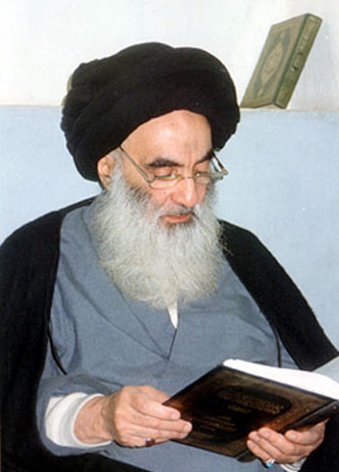
The Ayatollah Ali al-Sistani has used his powerful voice to plead for restraint in Iraq. He has called for respect for Christians and condemned the attacks on churches organized by Al Qaeda in Iraq. He has called for respect for Sunnis and called for punishment for anyone who attacks innocents or who harms Sunni mosques. He is hardly a classical liberal (far from it), but even the most bitter enemies of the Iraqi government have to acknowledge that the situation would be much worse without his voice. Unfortunately, his influential voice of restraint seems to have been increasingly marginalized by who have deliberately incited communal hatreds through attacks on mosques and churches, murder of religious pilgrims, and calculated attacks on civilian populations. The cry for revenge (and for seizure of complete power) by Muqtada al-Sadr finds ready followers in an atmosphere in which each group feels understandably feels itself under attack.
The San Francisco Chronicle ran a very clear analysis of the situation today and London’s Daily Telegraph has a disturbing portrayal of al-Sistani throwing up his hands in despair. Al Jazeera runs the story a bit differently, with al-Sistani laying down an ultimatum to the Maliki government to create security and disarm the militias.










Nathalie Vogel sent me a link to this article (http://www.americanthinker.com/articles.php?article_id=5774 ), which serves as an important reminder that one should certainly not get starry eyed about al-Sistani or other figures in the Middle East. It is still the case that he has been a voice against revenge, militia violence, and sectarian killings and it is not a good sign if, as some have interpreted his remarks, he has given up. (Again, another interpretation — see Al Jazeera above — is that he was laying down an ultimatum to the Maliki government.)
Hi Dr. Palmer,
I think that the Sunni-Shia conflict extends beyond the hand of Al-sistani or Al-sadr. The sectarian tension, having long been kept underground, is now emerging in the region. For many years, both Sunni and Shia were pushed to the margin. But given the circumstance today, each is presented with an opportunity to speak up, and with authority. Through the Sunni Arab government dominance over Shia minorities, most prominently in Saudi Arabia and previously under Saddam’s regime, Shiite were harshly pushed to the side. Similarly, the Islamic revolution in Iran, led by Shia authorities, played a vital role in keeping Sunnis in the background. This however changed when Osama bin Laden, followed by a strain of radical Sunnis fed on Whabbi ideology, emerged with authenticity after the attacks on 9-11. The following American attack on Sunni Iraqi regime and Sunni Taliban in Afghanistan could have only stirred up these groups. On the other hand, with the overthrowing of Saddam regime, and by bringing them into power, Shia enjoys an agreeable opportunity to claim authority after years of silence. What adds to the tension is Shia Hizbollah’s conflict with Israel. This is evident in Saudi Arabia, Egypt and Jordan openly criticizing Hizbollah for the lack of sense of responsibility. Some Saudi clerics even issued fatwas condemning Hizbollah. It is because Saudia Arabia is drawn on Sunni Islam, and because of its not-really-pleasant attitude toward Shiite, that they took on Hizbollah. It’s like watching a ping pong games between the two sects eagerly playing over power and authority. That, I find, is especially ominous
I admit that I find the politics, including religious politics, of the Middle East remarkably complex. The rise of a Shia Iraq is evidently quite worrying to other powers in the region, partly out of fears that it would align with Shia-governed Iran, which is why some Sunni political forces have been pouring money into the movement of Moqtada al Sadr in Iraq. They see a Shia-dominated state as the likely outcome and they want to bet on a winner, especially as al Sadr he has been emphasizing not only his Shia credentials, but very importantly, his Arab credentials, as well. (Sistani is, in contrast, both relatively anti-sectarian and a Persian.)
I had dinner (and a shisha) this evening with some very well connected and well informed people from Iraq who told me that the Al Jazeera interpretation of Sistani’s remarks was much closer to what he said than were the interpretations by the other media. He apparently laid down an ultimatum to Maliki’s government to disarm the militias (from all sides) before it is too late.
I don’t think that the worry lies in the possibility that Shia Iraq may align with Shia-governed Iran, considering the geographical and ethnic isolation of non-Arab Shia Iran. The 1979 war between the Iraq and Iran could only add to the gap. What I mean is that Shia’s awakening to power in Iraq may spur other Shia- who form approximately 75% of the population in the oil-rich region- to grow more assertive, specially in the countries where they constitute the majority and are ruled by a Sunni minority, such as in Bahrain where they represent 65% of the total population and in the Southern province of Saudi Arabia.